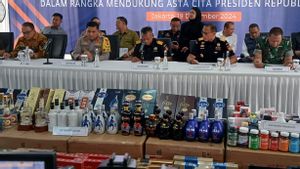JAKARTA - This year's National Aeronautics and Space Administration (NASA) will launch many missions into space, and managing communications with multiple spacecraft will become increasingly challenging.
With this, NASA's Jet Propulsion Laboratory (JPL) has turned to Microsoft's Azure Quantum technology to explore ways to more efficiently communicate with spacecraft exploring the Solar System and beyond.
JPL communicates with space missions relying on the Deep Space Network (DSN), a global network of large radio antennas located in California, Spain, and Australia, enabling constant communication with spacecraft as the Earth rotates.
Scheduling requests to use DSN antennas from space missions is often a major constraint and requires intensive computational resources.
All of these missions require access to primary communications, generating several hundred requests weekly when each spacecraft is visible to the antenna. Recent space missions such as Mars Perseverance and the James Webb Space Telescope have also required higher precision data operations which could increase the burden on DSN.
Launching Engadget, Friday, January 28, and that's where Microsoft believes Azure Quantum can help. The company applied some of what it learned to optimize quantum algorithms to solve NASA's scheduling problems using classical computers.
At the start of the project, it took Microsoft two hours to build a DSN schedule. But by using Azure Quantum, enterprises can reduce the time required to 16 minutes, and a custom solution reduces it to around two minutes.
The ability to create schedules in minutes, not hours, is something Microsoft says will give NASA flexibility and save time.
Microsoft says there's more work to be done before the system has all the features JPL needs, but that it could someday help the team as it prepares to launch more complex missions involving trips to the Moon and beyond the Solar System.
The English, Chinese, Japanese, Arabic, and French versions are automatically generated by the AI. So there may still be inaccuracies in translating, please always see Indonesian as our main language. (system supported by DigitalSiber.id)













